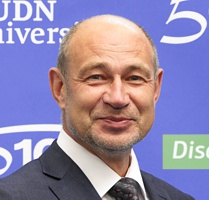Leading experts
Classes are taught by leading experts in digital journalism, computational mathematics, algorithms, linguistics and project management.
Field of study
Journalism
Master's
Full–time
Russian
₽ 380 000
$ 5250
Therefore, the ability of working with audiences, profiles, search results and other data is no longer a technical task, but serious media management. This programme will not only be useful for you. It is about a new superpower in the digital world.
Big Data Journalism is a two-year master’s programme for students who see their future in interacting with digital technologies.
Classes are taught by leading experts in digital journalism, computational mathematics, algorithms, linguistics and project management.
Opportunities for international, multilingual and interdisciplinary work.
Possibility of data processing on a supercomputer.
Any data array will be a source of even bigger data for you, and you will be able to convey the results of their analysis to your audience in the best possible way: in the form of a data article, a separate Internet project or a beautiful dashboard.
First year of study
Second year of study
Internships
Preparation and defense of the final graduation thesis
Students start to apply their practical skills already in their first year.
The programme provides for a full-time block (Campus Days), within which students attend different workshops and master classes and take part in business games. Campus Days is a modern training model whose main principles are an intensive format, a large amount of practical training, development of team skills, working with real cases from experts and company representatives and the opportunity to collect a portfolio from your own works.
During this period, students receive various tasks which will be assessed by specialists and counted as completing an internship. Every internship is aimed at consolidating the students’ learning results.
Key Partners:
Practical training and internship venues
Site — RUDN University.
Research competencies are developed through student participation in research projects. Working in interdisciplinary groups, students gain experience, skills and collect interesting material for their research internship or preparation of their master’s thesis.

Doctor habil. in Philology, Professor, Dean, Philological Faculty, Head of the Department of Mass Communication. Honorary Worker of Higher Education. Honorary Professor of Henan University (PRC).Member of the Union of Journalists of Moscow.
Phone: +7 (495) 787-38-03 доп. 1569
E-mail: barabash-vv@rudn.ru
Upon completion of the programme, graduates will be able to develop their knowledge in the following professions:
At present, a data journalist is in demand in the modern media space. Their skills will be useful in such areas as:
30
100%
Entrance examination is in the form of a portfolio competition